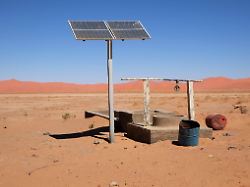German industry needs energy. Much energy. It will soon have to be climate neutral. The federal government sees a lot of potential in Algeria. But the problems are at least as big.
The sun is shining in Algiers – the weather is perfect for Federal Economics Minister Robert Habeck’s visit to the Algerian capital. The country is intended to become a piece of the puzzle in Germany’s energy strategy – first as a supplier of natural gas, then of green hydrogen, i.e. produced with solar energy. The meteorological conditions are correct, but there is still a lot of room for improvement in terms of political and structural conditions.
Habeck is not just concerned with sun, but also with natural gas. In view of the war in Ukraine, Germany has to replace Russia, its long-time major energy supplier. Algeria is one of the countries that the federal government is hoping for.
The country is the tenth largest gas producer in the world. Algeria ranks 13th in terms of the size of its gas reserves. The majority of the fields are not developed. So far, Algeria has produced about the same amount per year as Germany consumed before the Russian attack on Ukraine. Half of the gas is exported, the lion’s share of it to Europe. So far, very little has flowed to Germany. That should change.
But natural gas should only be an interim solution on the way to making the energy supply for German industry climate-neutral. Green hydrogen is an essential component of the energy transformation. Algeria is an ideal location for production – at least geographically.
This is not only due to the many hours of sunshine in the North African country on the Mediterranean and the space for huge solar fields, but also to its proximity to Europe. There is also already a pipeline network with which gas flows via Tunisia, through the Mediterranean, via Italy and Austria to southern Germany. This could be converted to transport green hydrogen.
Task force should help
So Habeck sets off for North Africa, accompanied by a delegation of business representatives. Investments and know-how from Germany are intended to help build a value chain around green hydrogen in the country. During his short trip, Habeck met the President, the Energy Minister and the Minister for Industry and signed a declaration of intent regarding future hydrogen deliveries from Algeria. For this purpose, a bilateral hydrogen task force is to be set up and a hydrogen pilot plant is to be built.
But whether green hydrogen will actually flow from Algeria to Germany at some point remains to be seen. Algeria is not a paradise for investors. Bureaucracy, corruption and a state-controlled economy – all of this combined is an enormous challenge. Regulations are suddenly changed, the power structures are opaque – the military and security organs are pulling the strings in the background.
In addition, the country is only slowly moving towards renewable energy. The importance of solar energy in the country shows how significant the obstacles are: Algeria has an average of 3,000 hours of sunshine per year. The Sahara takes up around two million square kilometers, so there is plenty of space for solar systems in Africa’s largest country. The vast majority of people live in cities on the coast, the rest of the country is only sparsely populated. These are perfect conditions for cheap solar energy. But it is hardly ever generated – instead, electricity is generated from gas instead of selling it to Europe.
At the moment it looks as if the government wants to break away from its dependence on oil and gas. An example is the most important prestige project, the world’s third largest mosque in Algiers, which is about to open. The huge structure offers space for 30,000 believers and has the highest minaret in the world at 265 meters. Solar cells on the roofs of the complex provide electricity and hot water.
